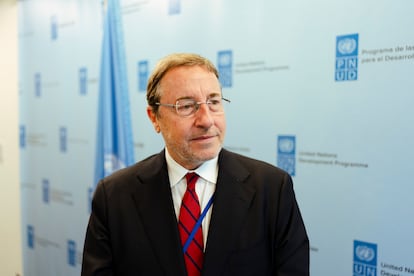‘We cannot make progress with the perception that, if we close our borders, everything will be fine again’
Achim Steiner — the administrator of the United Nations Development Programme — warns of the risk of greater global instability if rich countries stop investing in poorer ones. These lower-income nations are struggling with a climate emergency for which they are largely not responsible

Achim Steiner, 62, is the administrator of the United Nations Development Programme (UNDP). The Brazilian-German official receives EL PAÍS on the 21st floor of U.N. headquarters in New York City.
From his office, a sea of official cars can be seen crossing Manhattan with a police escort. These are the leaders who attend the U.N. General Assembly to try to fix a world that’s at war, increasingly unequal and suffocated by the climate emergency. Those who have the least pay the highest price for what diplomatic jargon now calls a “polycrisis.”
The data indicate that the development advances of the past are stagnating, or even regressing. “Many people feel deeply uncertain about the future, where our politics is deteriorating increasingly into a level of confrontation and polarization, which is undermining our ability to solve some of these problems. We’re in a difficult moment,” Steiner says. He warns that, when rich countries stop investing in the development of the poorest ones, fuel is added to the fire of global instability. “It’s a very bleak time in terms of multilateralism,” he adds.
Question. Development indicators show that, after a golden era of improvements, we’re sliding backwards. Meanwhile, donor resources are dwindling. Why?
Answer. The world is in trouble. We’re seeing a level of conflict and distress following Covid-19 and the subsequent financial crisis, which has translated into a debt crisis for many developing countries. This is intensified by climate change. Many people feel deeply uncertain about the future, where our politics is deteriorating increasingly into a level of confrontation and polarization that is undermining our ability to solve some of these problems. We’re in a difficult moment. We’re far behind where we wanted to be on the Sustainable Development Goals.
Q. U.N. member states have just signed the Pact for the Future to combat these inequalities. However, it’s not binding. What makes you think it will be fulfilled?
A. The Pact for the Future isn’t a philosophical document. It’s the distillation of hard negotiations between 193 countries on what needs to be done and what they need to do together. It’s reassuring because there are many things that countries agree that we need to work together on… but it’s not a guarantee that it will happen tomorrow, because it’s a very bleak time in terms of multilateralism. But that’s not the product of a failure of the United Nations. The United Nations is a reflection of the state of international relations.
Q. Does it make sense to talk about development when many countries cannot invest in education or healthcare, because they have to pay off exorbitant debts? Today, with high interest rates, the cost of servicing debts is higher than what’s received in foreign aid.
A. As you said, there are 50 countries that — in order to avoid defaulting — are raiding their education and health budgets in order to service their interest rate payments. The cost of [paying down debt] is equivalent to slowing down development, or even undermining it. I’m referring not only to debt, but also to the fact that the level of investment by countries in the OECD — the Organization for Economic Co-operation and Development — of only 0.37% of GDP [into lower-income countries] isn’t very strategic.
Q. The target of countries spending 0.7% of GDP on development aid is a long way off. Why is it so difficult for many countries to understand that not investing in development is a source of instability?
A. At this table, one delegation after another — from the richest countries — sits down and says: “Oh, my taxpayers don’t believe in international cooperation, they don’t believe that the U.N. is serving them well, we’re going to cut this budget.” I tell them that there are many European countries that rely on recruiting nurses and doctors from the developing world, and that health professionals don’t fall from heaven. They’re the product of years of investment in universities. There needs to be a better understanding of the return on investment, rather than asking African countries — which are already heavily indebted — to borrow money to invest in green energy, all to solve a problem they didn’t cause.
Q. How much influence does the populist, anti-aid agenda have in many countries?
A. We haven’t been able to communicate to our citizens clearly enough the impact that these investments have had. Foreign aid is a very easy issue to exploit [for political purposes]. If you’re unhappy with your government or your public services, you may think: “why should our money help someone else, when we don’t even know where they live?” We see a clear pattern of these campaigns in many countries. It’s not that citizens have become less supportive: just look at how people donate when there’s a disaster. But they’re told that the money is being taken from them and given to other people who they shouldn’t care about, even when their future is tied to those countries.
Q. Can you explain that further?
A. We’re living in the 21st century. Whether it’s the pandemic, global digital infrastructure, or climate change, we cannot make progress with the perception that, if we close our borders, everything will be fine again. That’s part of the political battle that’s being fought. The older we get, the more we dream of how good things were when we were young… but we live in the present. Going back in time has never been a recipe for success in any society.
Q. Apart from development aid, there are obvious problems in the global financial architecture.
A. Over the last three years, it’s been impossible to put a response to the debt issue in place through the G20. This is because countries are focused on themselves: the G20 mainly looks out for its own interest in terms of global financial stability.
Q. Are these countries looking inwards more than before?
A. Yes, much more. The G20 countries are, first of all, facing internal political and economic pressures. In the aftermath of the pandemic, many countries are faced with budgetary constraints in an environment of high inflation, high interest rates and rising debt costs. Those who pay the highest price will always be the poorest nations.
Q. Is this the most urgent reform?
A. Reforming the financial architecture is a top priority and has been recognized by the Pact for the Future. Financial markets are prohibitively exclusionary for many of the world’s poorest countries, meaning that they cannot access finance. The cost of capital is extraordinarily high. Credit rating agencies continue to treat many of these countries in a way that essentially shuts them out of the lending market.
Q. How unsustainable is the status quo?
A. Without reform, countries will become increasingly unable to invest in development. Some will go bankrupt. Without reform, we won’t just have economic problems, but also greater political instability: people won’t be able to buy food or pay for transportation and petrol. Politics could spill over into the streets and governments could be overthrown. We could see more polarization and extremism. We should be very worried, because a world that’s angry is prone to being manipulated. People are frustrated by injustice or by what they perceive as being unfair. That’s fuelling a level of political unrest that’s very easy to exploit.
Q. The climate emergency is hitting countries in the Global South head on. They cannot cultivate their land, vaccines cannot withstand such high temperatures… is the gap between rich and poor countries threatening to widen because of climate change?
A. We’re still able, in theory, to comply with the Paris Agreement on climate change. Nobody would have dreamt that the world would turn to the United Nations to provide a platform for agreeing on norms, on principles, on guardrails, for these transformative new technologies. In just a period of four or five months, we’ve seen the largest economies in the world — the U.S., China and Europe — investing hundreds of billions of dollars in the ecological transition. Meanwhile, countries such as Ethiopia ban diesel and petrol cars and only allow the import of electric vehicles. Kenya, Uruguay, or Albania manage to ensure that between 80% and 90% of their electricity production comes from renewable energy. It’s about seeing how we can do more and faster.
Q. However, all of this is clearly insufficient...
A. The truth is that we can already see climate change happening all around us. In the coming years, we will see who has to be held accountable. It’s no coincidence that more and more citizens are taking their governments — but also companies — to court. I think we’ll see this more in the coming years against companies that have continued to act consciously against the public interest and against fundamental rights. The problem is that this has been going on for years. These two realities coexist: a world ready to act against climate change, and then a group of actors — some of the most powerful in our economy — slowing down this transition.
Sign up for our weekly newsletter to get more English-language news coverage from EL PAÍS USA Edition
Tu suscripción se está usando en otro dispositivo
¿Quieres añadir otro usuario a tu suscripción?
Si continúas leyendo en este dispositivo, no se podrá leer en el otro.
FlechaTu suscripción se está usando en otro dispositivo y solo puedes acceder a EL PAÍS desde un dispositivo a la vez.
Si quieres compartir tu cuenta, cambia tu suscripción a la modalidad Premium, así podrás añadir otro usuario. Cada uno accederá con su propia cuenta de email, lo que os permitirá personalizar vuestra experiencia en EL PAÍS.
¿Tienes una suscripción de empresa? Accede aquí para contratar más cuentas.
En el caso de no saber quién está usando tu cuenta, te recomendamos cambiar tu contraseña aquí.
Si decides continuar compartiendo tu cuenta, este mensaje se mostrará en tu dispositivo y en el de la otra persona que está usando tu cuenta de forma indefinida, afectando a tu experiencia de lectura. Puedes consultar aquí los términos y condiciones de la suscripción digital.









































